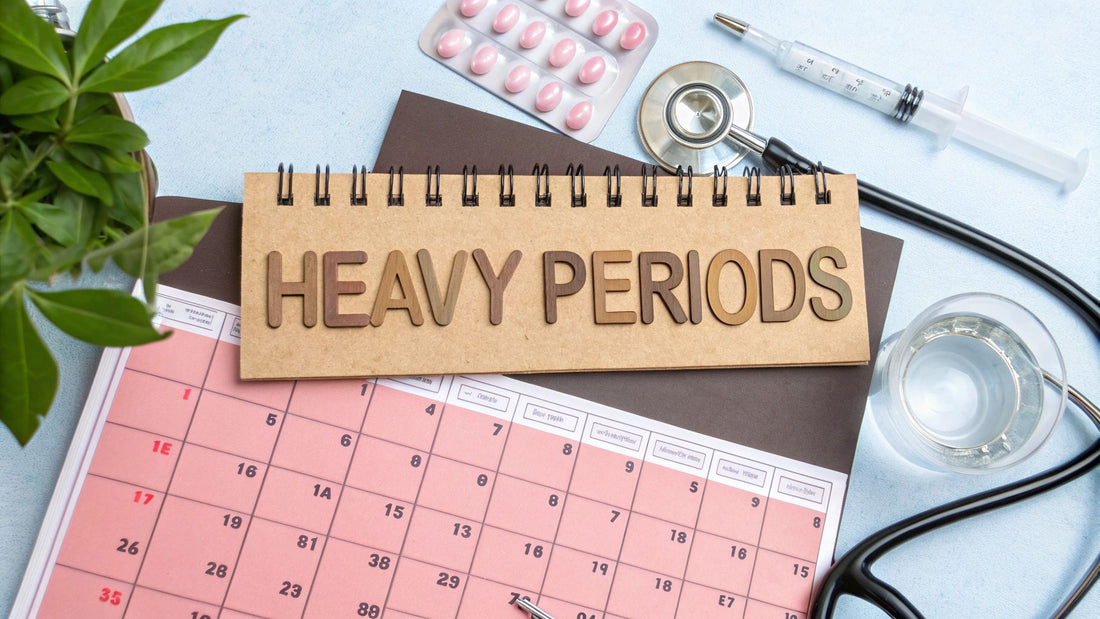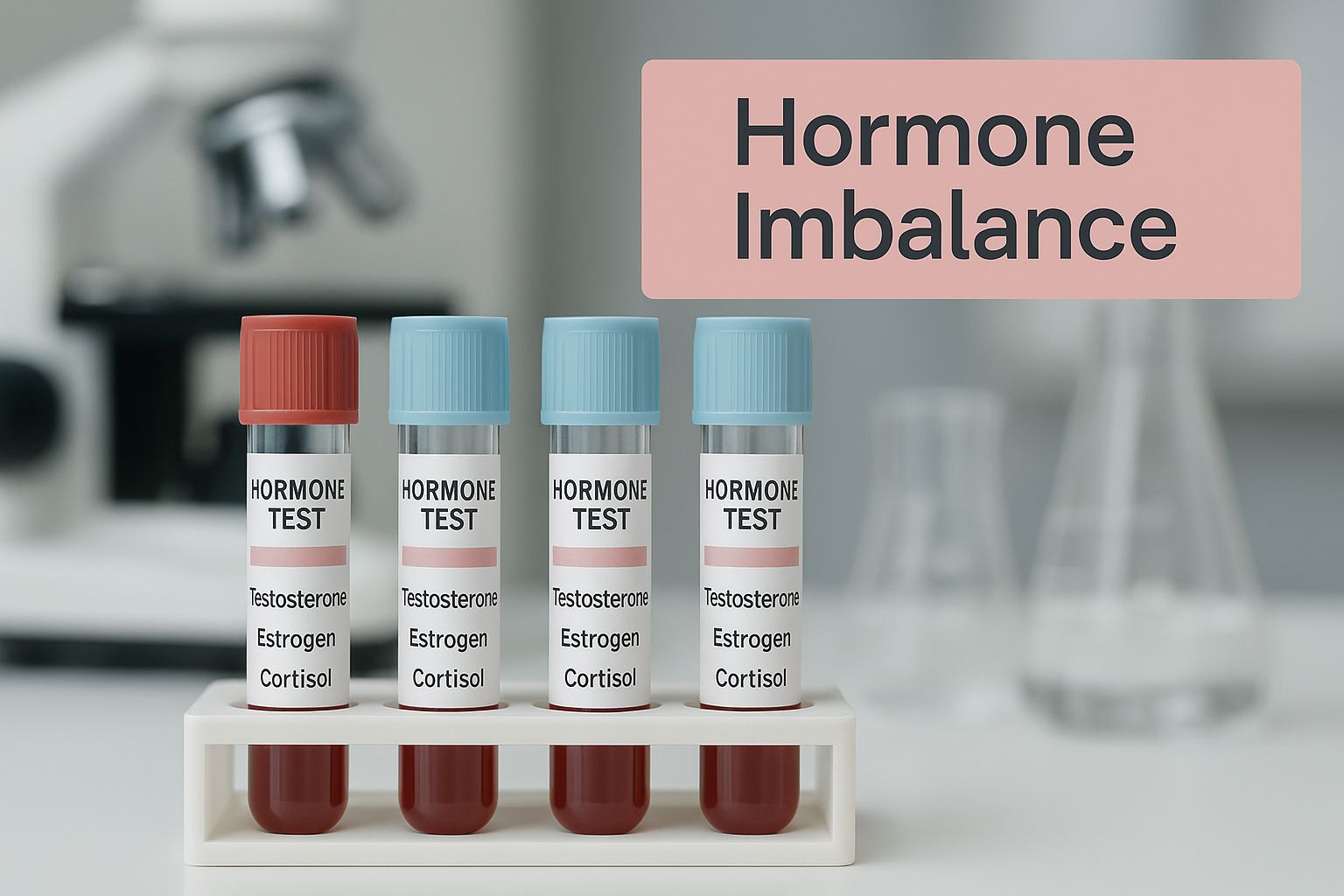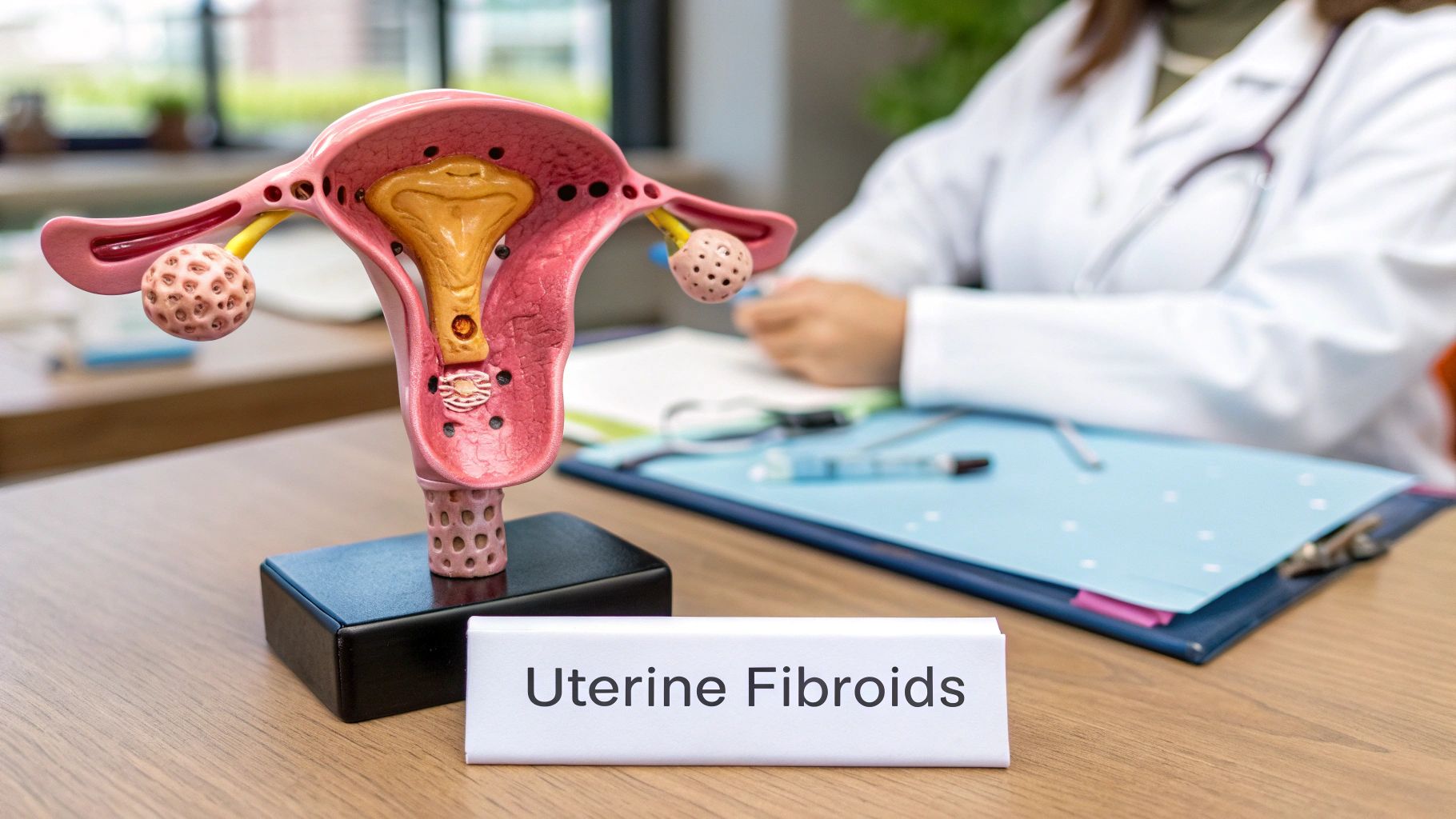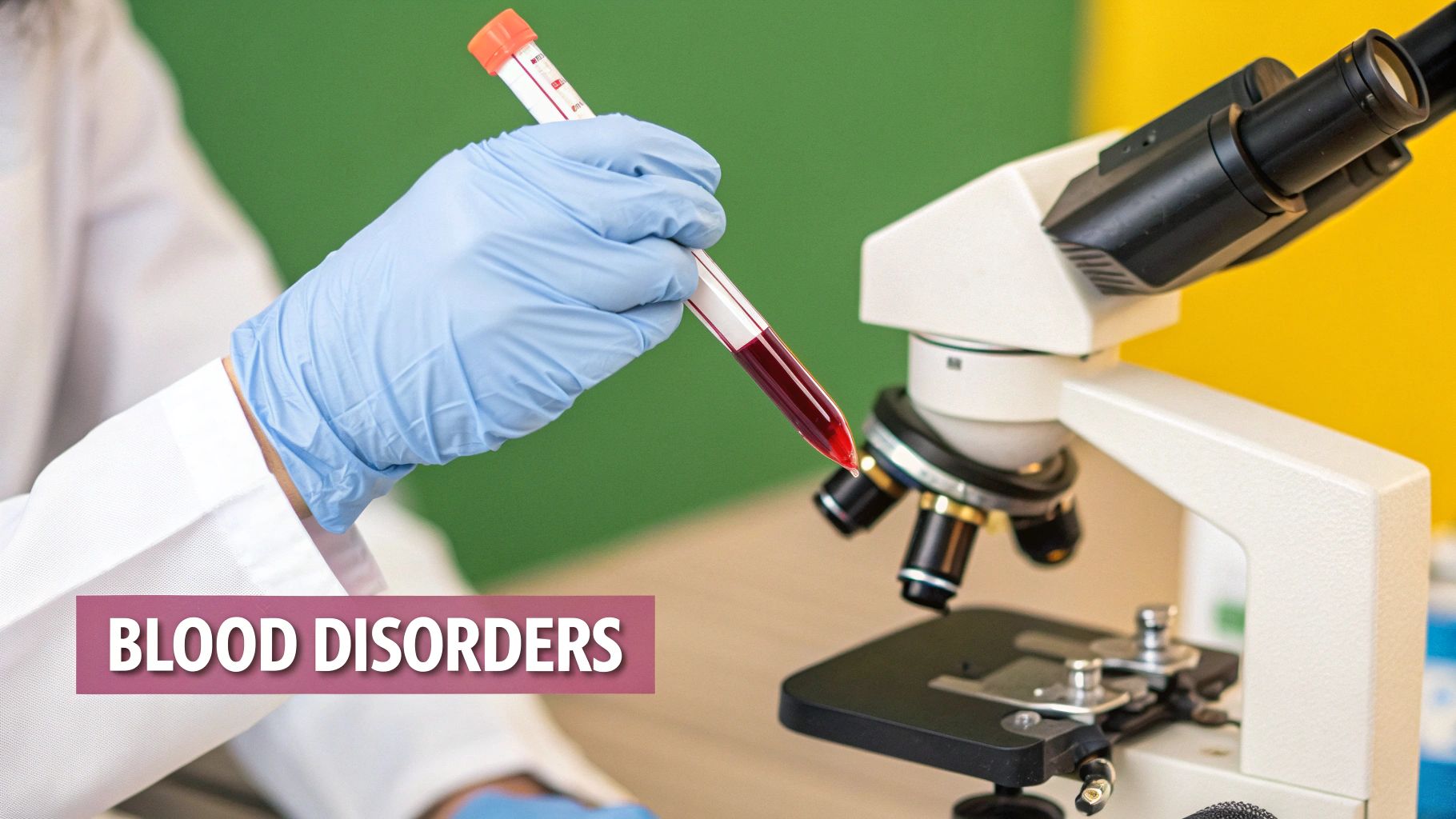
What Causes Heavy Menstrual Flow Your Caring Guide
Share
If your periods feel like they're running your life, you've come to a safe and loving space. Dealing with heavy menstrual bleeding, also known as menorrhagia, can be physically and emotionally draining, but understanding what might be going on is the first real step toward finding relief. It's often linked to straightforward things like hormonal imbalances, or uterine conditions such as fibroids or polyps, which we'll explore together, friend.
A Practical Guide to Heavy Periods
Feeling like your period dictates your schedule is a heavy burden to carry, and I want you to know you're not carrying it alone. It's the constant anxiety about leaking, the logistical nightmare of changing pads or tampons every hour, and the profound exhaustion that can make even simple tasks feel monumental. If this is your reality, you are so deeply understood here.
This guide is designed to gently cut through the confusion and give you clear, practical information. When you understand what’s happening in your beautiful body, you have the power to advocate for yourself and find the right support. We'll walk through the common signs, the underlying causes, and what you can do about it, so you feel held and equipped to take back control.
What Does 'Heavy' Actually Mean?
Clinically, a heavy period is often defined by the volume of blood lost, but that’s not a practical measure for most of us. What truly matters is the real-world impact it has on your day-to-day life. You don't need a measuring cup to know your flow is unmanageable.
"Too much is what a person feels is too much. Most people have a sense of what is too much menstrual bleeding, and if they feel like it’s too much for them, it probably is."
Ultimately, your period shouldn't force you to put your life on hold. If you're regularly cancelling plans, missing work, or living with a constant fear of accidents, that's a clear signal your flow is heavier than it should be, and you deserve support.
To make it easier to pinpoint, here's a quick checklist of common signs that point towards a heavy menstrual flow. Think of it as a way to validate what you're already experiencing.
Common Signs Your Menstrual Flow Is Heavy
| Symptom or Experience | What This Looks Like in Daily Life |
|---|---|
| Frequent Product Changes | You're changing a super tampon or pad every one to two hours, or even more often. |
| Doubling Up on Protection | You need to use both a tampon and a pad at the same time to feel secure. |
| Night-time Disruptions | You have to set an alarm or wake up during the night just to change your protection. |
| Large Blood Clots | You consistently pass clots that are larger than a ten-cent coin. |
| Extended Bleeding | Your period regularly lasts for more than seven days from start to finish. |
| Symptoms of Anaemia | You feel unusually tired, weak, dizzy, or short of breath during your period. |
| Life Interruption | You avoid social events, exercise, or even leave the house because of your heavy flow. |
If several of these experiences resonate with you, it's a strong indication that your periods are heavy and it's absolutely worth having a gentle chat with a healthcare professional.
You Are Far From Alone
It’s so easy to feel isolated when you’re dealing with this, but heavy menstrual bleeding is an incredibly common issue for women right here in New Zealand. You are part of a huge community.
Recent research reveals that around 72% of women have experienced a heavy menstrual flow at some point in their lives. More significantly, 28% report dealing with it often or always. These aren't just numbers; they represent thousands of women whose quality of life is being impacted, just like yours might be. You can read more about these findings at hologic.co.nz. This isn't some rare condition—it's a major health concern affecting so many of us.
Exploring Your Hormones and Uterine Health
Let's take a gentle look inside the body to understand the beautiful, complex orchestra that is your reproductive system. So often, the cause of heavy menstrual flow comes down to two main areas: your hormones and the physical health of your uterus.
Think of your key hormones, estrogen and progesterone, as dance partners. Throughout your cycle, they move in a graceful, coordinated rhythm. Estrogen helps to build up your uterine lining (the endometrium), making it a lush, welcoming place. After you ovulate, progesterone steps in to stabilise and mature this lining, getting it ready for a potential pregnancy.
When they’re in sync, your period is usually predictable and manageable. But if their rhythm gets thrown off—say, you have too much estrogen or not enough progesterone—the dance becomes chaotic. This imbalance can cause the uterine lining to grow much thicker than usual, leading to a significantly heavier bleed when it eventually sheds.
When Hormones Are Out of Step
An imbalance in this delicate hormonal dance is one of the most common reasons for heavy periods. It’s not a sign that you've done anything wrong; it's simply a reflection of how sensitive our amazing bodies are to both internal and external changes.
When your body doesn't ovulate in a particular cycle, it doesn't produce the progesterone needed to control the shedding of your uterine lining. This can result in a much heavier and more disorganised period.
Hormonal imbalance can be a central factor in heavy bleeding.

When the body's hormonal signals get disrupted, the entire menstrual process can be affected, often leading to a heavier flow. It’s also worth noting that chemicals in our environment can sometimes interfere with this process. To understand more, you might be interested in learning about how endocrine disruption can affect your periods.
Understanding Your Uterus
Beyond hormones, the physical structure of your uterus can also play a major part in heavy bleeding. Certain conditions can change its internal landscape, which in turn leads to a heavier flow. Let’s explore a couple of the most common ones with a bit of kindness and clarity.
1. Uterine Fibroids
Picture your uterine wall as a smooth, strong muscle. Fibroids are simply benign (non-cancerous) growths made of that exact same muscle tissue. They can pop up on the outside, inside the wall, or even within the uterine cavity itself. Depending on where they are and how big they get, fibroids can increase the surface area of your uterine lining. This means there's more tissue to shed each month, resulting in a heavier period.
2. Uterine Polyps
Polyps are a bit different from fibroids. Think of them as small, fragile growths that develop on the uterine lining itself. They're made of endometrial tissue and can be quite delicate. Their presence can cause irregular and often heavy bleeding because they disrupt the normal shedding process and can have their own fragile blood vessels that bleed easily.
Getting to the bottom of what causes heavy menstrual flow is all about understanding both the hormonal messages and the physical home they operate in. These conditions are incredibly common and treatable, and identifying them is the very first step toward finding relief.
Understanding Medical Reasons for Heavy Bleeding

Sometimes, a heavy period is more than just an inconvenience; it can be your body's way of signalling that something else is going on. This isn't meant to be a scary list of diagnoses. Instead, think of it as empowering information that can help you connect the dots in your own health story and turn confusion into clarity.
It’s a bit like tending to a garden. If one of your plants isn't thriving, you gently investigate the soil, the sunlight, and the water to figure out what it needs. In the same way, we can lovingly explore what might be happening inside your body to cause a heavier flow, giving you the knowledge you need for better conversations with your doctor.
Conditions Within the Uterus
Often, the most common reasons for heavy bleeding are related to conditions that directly affect the uterus and its lining. While the names might sound a bit clinical, the concepts are actually quite simple, and we can walk through them together.
Endometriosis is a condition where tissue similar to the lining of your uterus (the endometrium) grows in places it shouldn't, like on your ovaries or fallopian tubes. This rogue tissue still responds to your monthly hormonal cycle—it thickens and bleeds just like the lining in your uterus does. But because this blood has no easy way to exit your body, it can cause significant inflammation, severe pain, and sometimes, much heavier periods.
Adenomyosis is like a close cousin to endometriosis. Instead of growing outside the uterus, the endometrial tissue grows deep into the muscular wall of the uterus itself. This can cause the uterine wall to thicken and become enlarged, which often leads to painful, prolonged, and very heavy periods.
Hormonal and Systemic Conditions
Your period doesn't exist in a bubble; it's deeply connected to your body's entire ecosystem. When other systems are out of balance, your menstrual cycle is often one of the first places you'll notice a change.
Polycystic Ovary Syndrome (PCOS) is a perfect example of this connection. It's a hormonal condition that can interfere with regular ovulation. When you don't ovulate, you don't produce enough of the hormone progesterone, which normally helps regulate the build-up of your uterine lining. This can lead to a much thicker lining, resulting in infrequent but very heavy periods when they finally arrive.
Other broader health issues can also play a role:
- Thyroid Issues: Your thyroid gland is the master regulator of your metabolism, but its hormones are also in constant communication with your reproductive hormones. An underactive (hypothyroidism) or overactive (hyperthyroidism) thyroid can easily disrupt this delicate balance, leading to changes in your cycle, including heavy bleeding.
- Bleeding Disorders: For up to 20% of people with heavy periods, an inherited bleeding disorder could be the root cause. Conditions like von Willebrand disease affect how well the blood can clot. This means that when your period starts, the bleeding can be much heavier and harder to stop, right from your very first cycle.
The Importance of a Clear Diagnosis
Navigating these possibilities really highlights why it’s so important to seek a proper diagnosis if heavy periods are impacting your life. Here in New Zealand, research is shining a light on just how much these conditions affect day-to-day living.
One study found that over 80% of participants with gynaecological issues reported pelvic pain during their last three cycles, and a staggering 76% needed prescribed painkillers to cope. These figures paint a clear picture of the physical burden of heavy bleeding and show why a timely diagnosis is so crucial for finding real relief.
Understanding what causes heavy menstrual flow is a powerful act of self-care. It arms you with the language and knowledge you need to advocate for yourself and work with your doctor to find the gentle, effective support you deserve. To further protect your well-being, you can also learn about potential carcinogens in conventional tampons and make informed choices about your period care.
How Lifestyle And Medications Influence Your Flow

It’s easy to jump to complex medical reasons for heavy periods, but sometimes the cause is much closer to home—it can be a reflection of our daily lives or the medications we take. Our bodies don't operate in a silo; they're constantly responding to our environment, habits, and health choices with incredible wisdom.
Think of your menstrual cycle as a sensitive ecosystem. Things like stress, diet, and certain medications can disturb its delicate balance. Getting to grips with these factors is so empowering, as it gives you a much fuller picture of your overall health.
The Gentle Impact Of Daily Life
Our daily routines and emotional states are in a constant dialogue with our hormones. When life throws a lot at you, your body takes notice, and one way it might respond is with a heavier period. It's a complex interplay, but understanding the key players can make a world of difference.
Stress is a major factor here. When you’re under the pump, your body ramps up production of the stress hormone, cortisol. This can throw your other hormones—the ones that regulate your cycle—out of whack, sometimes leading to a heavier, more difficult period. It's your body's way of communicating, so be gentle with yourself.
Nutrition and body weight also play a significant role. Our body's fat cells actually produce a type of oestrogen. So, if your weight changes significantly, your overall hormone levels can shift, which in turn affects how thick your uterine lining gets and, ultimately, how heavy your flow is. It’s a powerful reminder of how interconnected our bodies are, and you can learn more about why you should take your vaginal health seriously during your period for even more ways to support your body.
When Medication Plays A Part
Sometimes, the answer to what causes heavy menstrual flow is sitting in your medicine cabinet. It’s important to be aware that certain medications and contraceptives can directly influence your bleeding, and knowing this is a key part of lovingly managing your health.
If you suspect a medication might be affecting your cycle, it's always a wonderful idea to have a chat with your doctor.
A conversation about your medications is never a waste of time. Your doctor can help you understand if your prescriptions are contributing to your heavy flow and explore alternatives if needed. You are your own best advocate.
Here are a few common medications that can lead to heavier periods:
- Blood Thinners (Anticoagulants): This is probably the most straightforward connection. Medications like warfarin or even daily low-dose aspirin are designed to stop blood from clotting, so it makes sense that they can lead to a heavier menstrual flow.
- Copper IUD (Intrauterine Device): While it's a brilliant hormone-free birth control option for many, the copper IUD is well-known for causing heavier, longer, and sometimes more painful periods. This is especially common in the first year as it works by creating a mild inflammatory response in the uterus.
- Certain Antidepressants and Herbal Supplements: Some medications, and even natural supplements like ginkgo or ginseng, can have a mild blood-thinning effect or influence hormone levels, potentially contributing to a heavier period.
Understanding these external factors gives you more pieces of your personal health puzzle. It helps you feel more in control and better prepared for any conversations you need to have with your healthcare provider.
Getting to the Bottom of It: Your Diagnostic Journey
Walking into a doctor's surgery to talk about heavy periods can feel intimidating, but it's a huge and courageous step toward taking back control of your health. Think of this as your roadmap for that conversation, so you know exactly what to expect and can feel confident and prepared.
Your doctor is there to listen and piece together your story. They'll want to understand what you've been experiencing, so they'll ask some questions about your cycle, your symptoms, and how it's all impacting your beautiful life.
Kicking Off the Conversation
To get a clear picture, your doctor needs to understand your unique situation. You don't need to know any fancy medical terms; just explaining things in your own words is perfect. It can be helpful to think about a few details beforehand, though.
They'll likely ask about things like:
- How long your cycle is and the number of days you bleed.
- On your heaviest days, how often are you changing your pad or tampon?
- If you're passing large clots, and roughly how big they are.
- Any other symptoms you've noticed, such as pain, extreme tiredness, or feeling dizzy.
It's worth remembering that no detail is too small or too embarrassing. Your doctor has heard it all, and your honesty is the key that helps them figure out what's really going on with your heavy bleeding. You are so brave for speaking your truth.
What to Expect Next: Common Diagnostic Steps
After you've shared your experience, your doctor might suggest a few follow-up checks. These are all standard, gentle procedures designed to gather more information and rule out different causes. Each step provides another piece of the puzzle.
1. A Gentle Pelvic Exam
This is a routine physical check-up where your doctor will gently feel your pelvic area. It’s a quick way for them to check for any noticeable changes in the size or shape of your uterus or ovaries, which could point to something like fibroids. It’s a very common part of looking into any period-related issues.
2. Simple Blood Tests
A quick blood test can tell your doctor a surprising amount. They'll almost certainly check your iron levels to see if the heavy bleeding has led to anaemia – a really common reason for that bone-deep fatigue many people with heavy periods feel. They might also check your thyroid and other hormone levels to see if an imbalance is playing a role.
3. An Ultrasound Scan
An ultrasound is essentially a way to get a look inside your uterus. It’s a totally painless and non-invasive scan that uses sound waves to create a picture of your pelvic organs. It's brilliant for spotting things like fibroids, polyps, or a thickened uterine lining, giving your doctor a clear view of what might be causing the trouble.
Taking these steps is all about advocating for your own wellbeing. You're working with your doctor to gather the facts, building a partnership to find a solution that helps you feel like yourself again. You're on the right track, and you're doing wonderfully.
How to Manage Heavy Periods and Feel Better
Getting answers about why your periods are so heavy is a massive step. It's so empowering. The next part of the journey is finding a path that helps you feel better, lighter, and more in control. This isn't about looking for a single "cure," but exploring all the options out there, from simple things you can do at home to supportive medical treatments.
Think of it like tending to a garden. Sometimes all you need is a little extra care and nourishment. Other times, you might need an expert to lend a hand. We'll walk through these pathways together, so you can feel totally prepared for a confident chat with your doctor about what’s right for you.
Looking After Yourself at Home
Before we get into medical treatments, let's start with the kind, simple things you can do for yourself right now. Managing heavy periods isn't just about reducing the flow; it’s about replenishing your body and easing discomfort.
When you lose a lot of blood, you also lose a lot of iron. This is what leads to that bone-deep exhaustion so many of us know all too well. Gently boosting your body with iron-rich foods can make a huge difference to your energy levels.
- Leafy Greens: Think spinach, kale, and silverbeet.
- Lean Meats and Seafood: Red meat, poultry, and fish are all excellent sources.
- Legumes and Tofu: Lentils, chickpeas, and tofu are brilliant plant-based options.
A little trick is to pair these foods with a source of Vitamin C—like citrus fruits, capsicums, or broccoli—to help your body absorb the iron much more effectively. It’s a small act of kindness for your body that can help you feel stronger from the inside out.
Medical Support to Lighten the Load
Sometimes, lifestyle changes just aren't enough, and that is completely and totally okay. This is where your doctor becomes your biggest advocate, offering a range of medical options designed to lighten your flow and help restore your body's balance.
These treatments are incredibly common, safe, and can be genuinely life-changing. They usually fall into a few main categories.
1. Hormonal Treatments
These work by helping to regulate your hormones, which in turn thins your uterine lining so there's less to shed each month.
- The Pill: Combined oral contraceptives contain oestrogen and progestin, which can make periods much lighter and more predictable.
- Hormonal IUD: Devices like the Mirena release a tiny amount of progestin directly into the uterus. For most people, this dramatically reduces bleeding.
2. Non-Hormonal Medications
If hormonal options aren't for you, don't worry—there are other effective choices. Tranexamic acid is a medication that helps your blood clot more effectively just in the uterus, reducing flow without touching your hormones. Anti-inflammatory drugs like ibuprofen can also help by lowering prostaglandin levels, which can reduce both bleeding and cramps.
"Finding the right treatment is a partnership between you and your doctor. Your comfort, lifestyle, and health goals are at the centre of every decision, ensuring the path you choose feels right for you."
Exploring Procedural Options
For some people, when other treatments haven't brought enough relief, it might be time to discuss procedural options. These are usually considered only after other avenues have been tried, and it's important to understand them properly so you feel safe and informed.
One such option is endometrial ablation, a procedure that removes the lining of the uterus (the endometrium) to reduce or even stop menstrual bleeding. It's a minimally invasive choice for those who are certain they don't want to get pregnant in the future.
A hysterectomy, the surgical removal of the uterus, is a major operation and is generally seen as a last resort. Treatment approaches in New Zealand are always evolving, with a growing focus on trying less invasive treatments first. For instance, our country's hysterectomy rate is about 134 per 100,000 women—much lower than in Australia, but still higher than in some European countries. You can read more about New Zealand's treatment pathways for heavy menstrual bleeding, which really highlights this shift towards gentler alternatives wherever possible.
Got Questions About Heavy Periods? We Have Answers.
It’s totally normal to have questions about your body and your period. If you're searching for answers about a heavy flow, please know you are definitely not alone. We've put together some of the most common queries we hear, answered with the same care and understanding you've seen throughout this guide.
Our aim here is to give you clear, reassuring information to help you feel more confident on your health journey. Let's walk through some of these common concerns together.
When Is a Heavy Period a Medical Emergency?
While a heavy flow is common, sometimes it can signal something more serious that needs immediate medical attention. The most important thing is to trust your gut and your body's wisdom, but there are a few specific red flags that mean it's time to get help straight away.
You should seek urgent medical care if you experience any of these:
- Soaking through protection very quickly: This means soaking a pad or tampon in less than an hour, for several hours in a row.
- Passing very large clots: We’re talking about blood clots that are consistently larger than a 20-cent coin.
- Feeling dizzy or faint: If you feel light-headed, dizzy, short of breath, or like you might pass out, it could be a sign of significant blood loss leading to anaemia.
If something just feels off, please always get it checked out by a health professional. Your peace of mind is so important, and it’s much better to be safe and get the reassurance you need. You deserve to feel safe in your body.
Can Heavy Periods Get Worse with Age?
Yes, they absolutely can, and it's a shared experience for many. It’s quite common for periods to change as you get older, and for many women, they become heavier and more unpredictable in the years leading up to menopause. This stage is called perimenopause.
What’s happening is that your hormone levels, especially oestrogen and progesterone, start to fluctuate unpredictably. This hormonal rollercoaster can cause the lining of your uterus to build up more thickly than usual, which then leads to a much heavier flow when your period finally arrives.
On top of that, some of the underlying causes we’ve talked about, like uterine fibroids, also become more common with age. But please remember, no matter how old you are, a debilitatingly heavy period isn't something you just have to put up with. There are always gentle and effective ways to manage it.
Is It Normal to Have Heavy Periods from the Start?
For some people, yes. In the first few years after you start menstruating, your cycles can be all over the place. Your body's hormonal system is still maturing and finding its groove, and this can sometimes lead to some pretty heavy periods as it learns its new rhythm.
However, if your flow has been consistently heavy right from the very beginning, it could be a clue that something else is going on. For example, up to 20% of adolescents with heavy menstrual bleeding might have an inherited bleeding disorder, like von Willebrand disease, which affects how well the blood can clot.
If your periods have always been super heavy, it’s a really good idea to chat with a doctor you trust. They can look into all the possibilities and make sure you get the right support from the very start of your menstrual journey. Figuring out the "why" behind your heavy flow is the first step to making your period more manageable and a lot more comfortable.
At Crimson Organic, we believe period care should be kind to your body and our planet. Our GOTS-certified organic cotton tampons and innovative period pain relief heat belts are designed to give you comfort and support, so you can navigate your cycle with confidence. Explore our range of premium, sustainable products at https://crimsonorganic.co.nz and experience a period that feels better.
